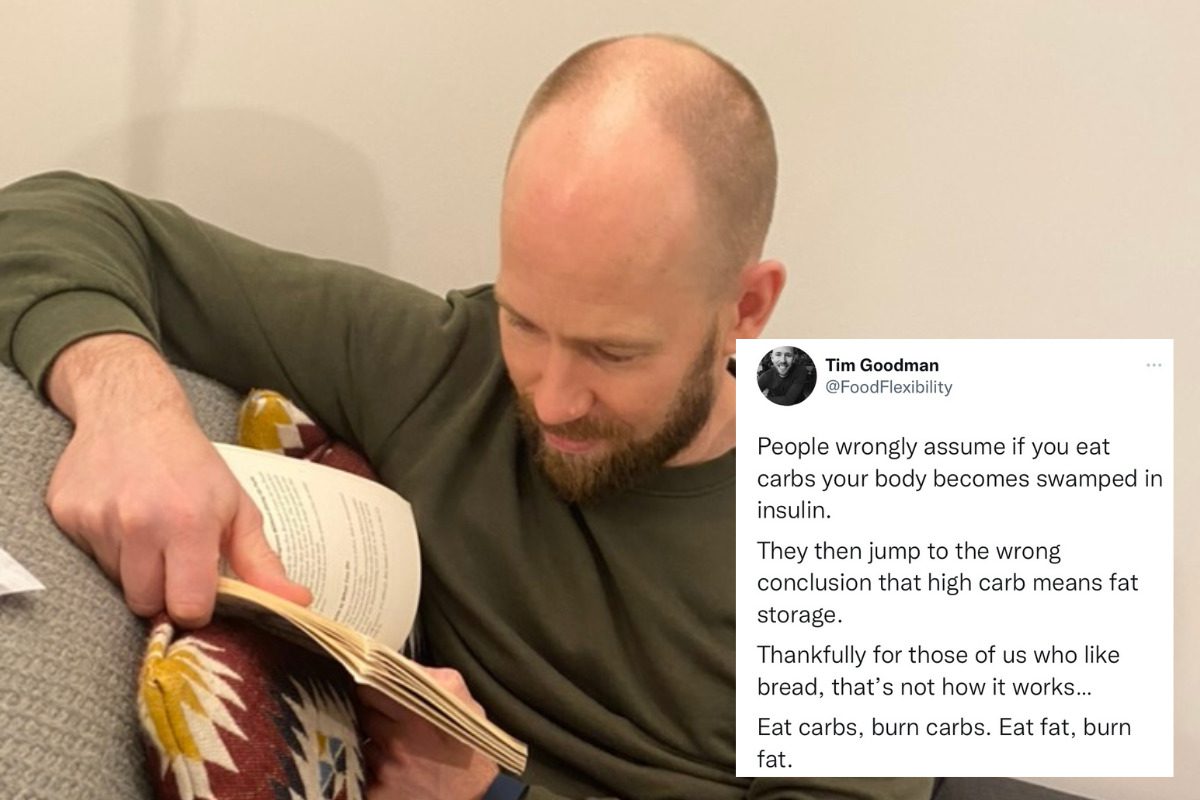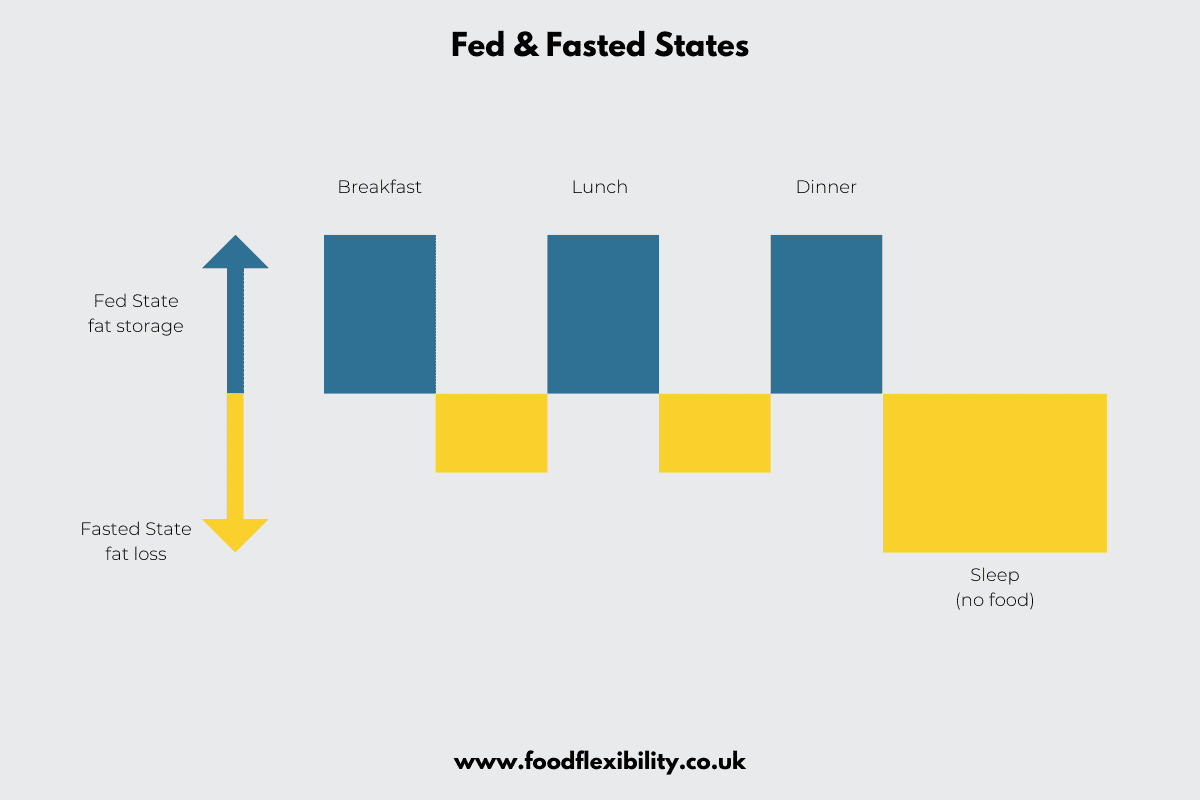Why Insulin Causes Fat Storage but Doesn’t Make You Fat
Lots of you ask me about insulin.
You’re worried about things ‘spiking’ your insulin and causing fat storage.
But that’s not how it works:
- Eating carbohydrates, including sugar, does ‘spike’ your insulin but so does eating protein
- Some people worry about artificial sweeteners but even if they did ‘spike’ insulin (which they don’t) it wouldn’t be an issue if you’re healthy
The thing is, if you’re healthy, the insulin fairy isn’t going to come and steal your gains or make you fat.

The Truth About Insulin:
Whilst insulin can trigger fat storage, it doesn’t make you fat.
To explain why, you’ll need some context.
What you are told:
❌ By eating carbs your insulin ‘spikes’
❌ Insulin ‘spikes’ make you fat
But does it make sense that you have evolved a mechanism to punish carbohydrate intake when carbs are the most plentiful food source there is?
No!
Fun fact:
All carbohydrates get broken down into glucose eventually.
So, whether you eat a potato or a cube of sugar, by the time it reaches your bloodstream your body knows no different.
Sure, a potato is more filling, nutritious and better for your teeth than a cube of sugar but you knew that already…
Anyway, to explain why insulin doesn’t make you fat I need to explain what insulin does.
What happens when you eat?
Let’s take an example, eating a slice of pizza.
Your body’s job is to break down the food you eat into its smallest components:
- Carbohydrates (from the dough and vegetables) are broken down into glucose (sugar)
- Proteins (from the meat/cheese) are broken down into amino acids
- Fats (from the meat/cheese/oil) are broken down into fatty acids
These nutrients make their way into your bloodstream where eventually they’re moved into your cells for future use.
That’s where insulin comes in…
What is insulin?
Insulin is a hormone controlled by your pancreas.
Hormones are essentially messengers that your body produces which ‘tell’ organs and tissues what to do:
- Food you eat is broken down into nutrients that end up in your bloodstream
- Your body detects nutrients in your blood and insulin is released from your pancreas
- This insulin ‘tells’ your muscle and fat cells to absorb those nutrients
- Once nutrients are stored, insulin reduces as there’s nothing left for it to do
- Your pancreas then sits on ‘standby’ ready to release insulin the next time you eat
Insulin allows healthy control of your glucose levels which is vital because:
- Without glucose, you’d run out of the main source of fuel for your brain
- Too much glucose can be very harmful to health
When you eat very few carbohydrates, your body has a survival mechanism it can fall back on called ‘ketosis’ but that’s the subject of another blog.
Insulin doesn’t sound too bad!
Nope!
Where insulin gets a lot of flak is its role in fat storage but blaming it for fat gain is jumping to the wrong conclusion.
Often the argument goes like this:
❌ Eat lots of carbs and your insulin ‘spikes’ which tells your body to stop burning fat and store it instead
❌ Eat fewer carbs and insulin stays low burning more fat and keeping you lean
Although both are false, the last statement is quite attractive. Good news always gets shared even if it’s fake…
How fat storage works
People wrongly assume that if you eat a bunch of carbs every day your body becomes swamped in insulin leaving levels chronically high.
‘Influencers’ jump to the wrong conclusion, that a high carb diet means you are permanently in a state of fat storage leaving you unable to burn fat.
Thankfully for those of us who like bread, that’s not how it works…
Ultimately if you eat carbs, you burn carbs. If you eat fat, you burn fat.
It’s like humans have evolved over millennia to use the food available so that we don’t starve to death…
Anyway, back to the science…
As I’ve said earlier, insulin does signal your fat cells to store nutrients but that doesn’t mean you end up fat.
You’d need to overeat consistently for weeks for that to happen.
Think of it like this, if you fill a Formula 1 car with fuel and drive it for a few laps do you come back to the pits with more fuel in the tank than when you started?
No, you don’t!
The only way that could happen is if you filled it up with more fuel before you got back to the pit lane.
For your body to store fat, you must give it an excess of energy over time.
How can you store fat but not get fat?
The amount of fuel your body burns each day vs the amount of fuel you put into it (food) is known as energy balance.
Fuel In – Fuel Out = Energy Balance = Calorie Balance
Add more fuel than you burn and some of that fuel is stored as body fat, and you slowly gain weight (energy surplus).
Put in less fuel than you burn, and your body taps into fat stores for the energy it needs, and you slowly lose weight (energy deficit).
Your body needs energy from glucose to work, it’s vital fuel to keep you alive. In fact, under normal circumstances your brain can only run using glucose as a fuel.
When we eat food and give our body a relatively large amount of energy (calories) in a short time glucose levels are higher than you need for survival. Rather than waste it, your body saves this fuel for future use.
Think of this storage like charging your iPhone battery so you don’t need to keep it plugged into the wall all day.
The period where your body is absorbing nutrients is often called the ‘fed state’.
Once all nutrients are absorbed, you enter a ‘fasted’ state where you’ve run out of nutrients in your bloodstream and your body turns to its fat stores for fuel.
Every day, your body switches from ‘fed’ to ‘fasted’, storing fat from the food you eat then burning what you’ve stored once there’s nothing left to use from that food.
It looks like this:

In the fed state (blue) you have excess energy in your bloodstream from the food you have eaten.
In the fasted state (yellow) you’ve run out of energy and need to tap into your fat stores for fuel.
If the blue and yellow parts balance each other out each day your body fat stays the same.
But, if you eat more fuel than you need, then the blue portions exceed the yellow and you gain body fat over time.
Your body fat levels only increase over time if you overeat
Simple as that!
Much like you can’t charge your iPhone without a power supply, insulin cannot magically create fat from energy that isn’t there in the first place.
There is a ton of research showing that energy balance, not the amount of carbs or fat in the diet determines body composition.
Should you worry if you’re bulking?
Probably not…
Whilst it’s possible to build muscle in a slight calorie deficit with the right programming optimal muscle gain (and sport performance) requires a slight calorie surplus, and that diet should be carb heavy to fuel explosive power (more on that here).
Whilst a small calorie surplus minimises fat gain on a bulk, some is inevitable.
Excess carbohydrates which create a calorie surplus are an issue if you are inactive and obese but active folks don’t need to worry.
Exercise increases the amount of glucose we burn, and it also increases our muscle’s capacity to store it.
So lean*, active people with a high carb intake don’t need to worry.
*’generally lean’ means a waist size under 94cm for men and under 80cm for females but that depends on ethnic background.
If you’re not sure if you’re lean, check out the NHS advice on BMI.
Insulin and diabetes
Type 1 diabetes is often genetic and happens because the body’s immune system attacks and destroys the cells that produce insulin which means glucose levels rise to dangerous levels and need to be controlled by administering insulin.
So, please remember it’s not OK to make jokes about sugar ‘making you diabetic’
Type 2 diabetes is (usually) due to chronic elevation of glucose in the blood from a consistent calorie surplus and elevated bodyweight which lead to insulin receptors becoming ‘overworked’ and damaged.
Just because living with type 2 diabetes is sometimes referred to as a ‘lifestyle disease’ by some doesn’t mean it’s cool to assume it’s easily ‘fixed’. Never judge a person without standing in their shoes…
https://www.nhs.uk/conditions/diabetes/
In Summary
The most important thing for you to remember from this article is that if you eat like a grown up, exercise regularly and keep an eye on your calorie balance, so you stay reasonably lean, then you don’t need to worry.
If you are not reasonably lean, inactive, and regularly eat a ton of carbohydrates then that might give you issues at some point.
Got a Question?
Did I explain that in a way you could easily absorb (pun intended)?
If you have a question, post it in the comments, I reply to them all!
Know someone this would help? Give it a share on your favourite social media platform using the links below 👊
References:
BTN Academy: The Science of Nutrition Coaching – Bainbridge, Coomber, Fogarty, Hawkins, Herbert
https://www.nhs.uk/conditions/diabetes/
https://www.nhs.uk/conditions/obesity/
Inspired by
How Insulin Really Works: It Causes Fat Storage…But Doesn’t Make You Fat
Insulin… An Undeserved Bad Reputation




[…] By the way, if someone is insisting sugar makes you fat because it ‘spikes your insulin’, get them to read this. […]